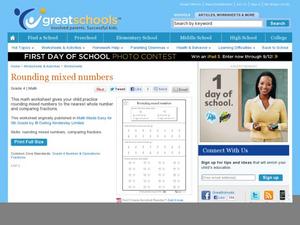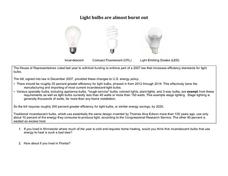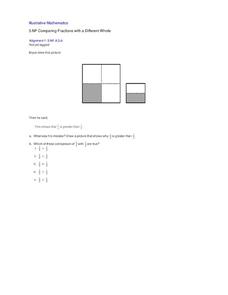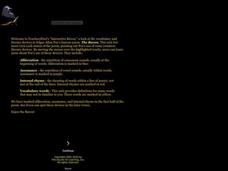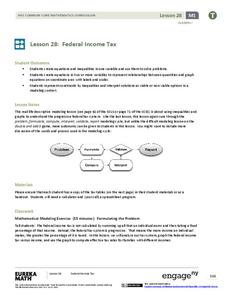Science 4 Inquiry
Edible Plate Tectonics
Many people think they can't observe plate tectonics, but thanks to GPS, we know that Australia moves at a rate of 2.7 inches per year, North America at 1 inches per year, and the Pacific plate at more than 3 inches per year! Scholars...
Howard Hughes Medical Institute
Drug Adherence and Resistance
The FDA approved more than 25 drugs to treat HIV—and often people must use them in combination. One of the largest challenges with these medications happens due to patient error. Class members use an interactive to learn about drug...
California Department of Education
Evaluating Web Sites
If it's on the Internet, it must be true—right? How can someone tell if a website contains less-than-truthful information? Savvy surfers evaluate sources in the fifth of a six-part college and career readiness instructional activity...
California Academy of Science
Optimal and Sustainable: Renewable Energy Revamp
More than 100 cities around the world have shifted from fossil fuels to renewable energy sources. Scholars investigate a city wanting to make this switch, but needs help determining how to make the shift. Groups consider all options,...
College Board
2006 AP® Calculus AB Free-Response Questions
Develop more than just a topical approach to the exam. The six free-response questions from 2006 reveal how the AP exam assesses topics. By using the questions, pupils practice topics such as velocity, sketch slope fields, solving...
EngageNY
Grade 5 Math Module 1, Topic B, Lesson 5
There is more than one way to write a number. The lesson plan provides teachers with a way to teach reading and writing decimals to thousandths using standard, expanded, and unit forms. Pupils work through in-class and homework...
EngageNY
Percent
Extend percent understandings to include percents less than one and greater than 100. A great lesson has pupils build upon their knowledge of percents from sixth grade. They convert between fractions, decimals, and percents that are less...
Illustrative Mathematics
One, Ten, and One Hundred More and Less
What's 1 more or less than a number? What's 10 more or 10 less than a given number? What's 100 more or 100 less than a number? These are the types of problems learners must answer in a six-question worksheet.
Fraction Bars
Inequality of Fractions
Here is a fine lesson on inequalities of fractions for your third graders. After a modeling session by the teacher, pupils are put into groups and are led through a discovery session using fraction bars and inequalities. The lesson...
Curated OER
Less and More Scavenger Hunt
Send your scholars on a measuring scavenger hunt with this interactive worksheet! They use a graphic organizer to record their findings as they search for items which are less than, more than, or just about one inch long. For each, they...
Curated OER
Rounding Mixed Numbers
Is your class having trouble with mixed numbers and rounding to the nearest whole number? Use this instructional activity in your fractions unit to help struggling math students with this tricky skill. An example demonstrates how to...
Curated OER
Bernardo and Sylvia Play a Game
This activity presents a game played by two learners whose solution is an exercise in creating and analyzing with algebraic inequalities.
Willow Tree
Mean, Median, and Mode
Statistics are more than just numbers—they can give you important information about a set of data. Pupils learn how to find the mean, median, and mode of a data set. They also find the next score to reach a desired mean.
Curated OER
Venn Diagrams
The Venn diagram is an important graphic organizer, and learners should be familiar with it. Here, pupils compare things that are made of plastic and metal, and they identify the things that have both substances in them. There are two...
Curated OER
Light Bulbs are Almost Burned Out
Incandescent light bulbs were enlightening more than 130 years when Thomas Edison invented them. More recently, US Congress passed legislation to increase efficiency standards. Your 5th, 6th, or 7th graders will be enlightened as they...
Curated OER
Comparing Fractions
Learners compare three sets of fractions using the greater than, less than, and equal signs. To justify their answers, a drawing is also required that illustrates their reasoning. Including fractions with like and unlike denominators, as...
Curated OER
Comparing Fractions with a Different Whole
What was Bryce's mistake? Through analysis of a student work example, learners develop their own ability to compare the fractions one fourth and one half. Central to this activity is the concept that, when comparing fractions, the whole...
Curated OER
Comparing Fractions with the Same Denominator, Assessment Variation
A short, multiple choice assessment that determines your 3rd graders' ability to correctly compare fractions with like denominators. This quiz asks learners to compare two fractions using words, the greater than/less than symbols, and...
Curated OER
Comparing Fractions with the Same Numerators, Assessment Variation
Have your class demonstrate their ability to compare fractions with this short multiple-choice assessment. Using the fractions 9/8 and 9/4, the learners first make comparisons using both words and the greater than/less than signs. Next,...
Curated OER
Number Value Assessment
Quiz your second graders with this set of math worksheets involving place value, word problems, number sequence, greater than/less than, coin value, expanded form, and much more! Most have multiple choice answers provided, and generally...
Curated OER
Fishing Adventures 3
Your young boaters will enjoy writing and solving inequalities, and representing the solution graphically in this task set in the context of renting a boat.
EngageNY
Federal Income Tax
Introduce your class to the federal tax system through an algebraic lens. This resource asks pupils to examine the variable structure of the tax system based on income. Young accountants use equations, expressions, and inequalities to...
American Museum of Natural History
Tornadoes Spinning Thunderstorms
Tornado winds can reach more than 200 miles per hour. Learners explore wind speeds and more characteristics of tornadoes with an online lesson. They learn how tornadoes form and how scientists attempt to predict them. Can be used as an...
Curated OER
St. Patrick's Day Art Projects
Activities to make March 17th more than just a day for the wearing of the green!












